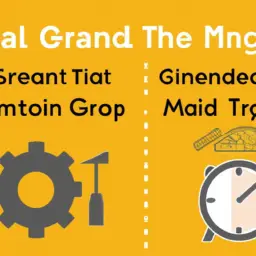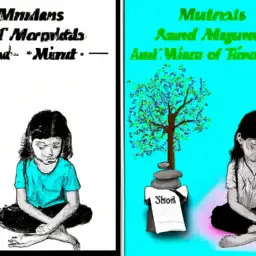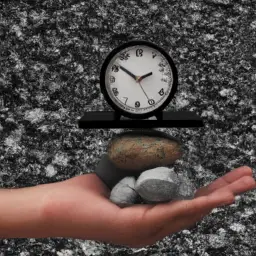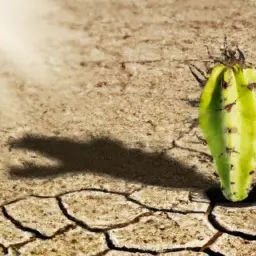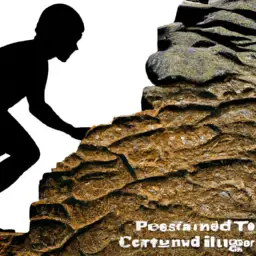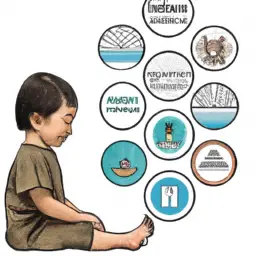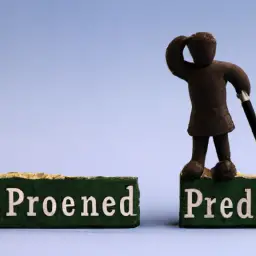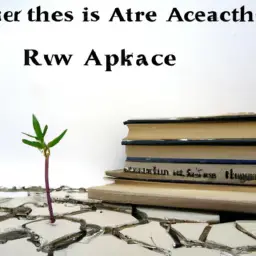Do you ever feel like giving up when faced with challenges or setbacks? It’s a common feeling, but have you considered the benefits of pushing through and persevering? That’s where grit comes in.
Grit is the combination of passion and perseverance in pursuit of long-term goals, and it’s been linked to increased happiness and fulfillment in life. Research has shown that grit is a better predictor of success than talent or intelligence.
It’s not just about being tough or stubborn, but rather having a deep commitment to achieving your goals and the ability to bounce back from failures. By cultivating grit, you can not only achieve your goals, but also improve your overall well-being.
In this article, we’ll explore the science behind grit and its connection to happiness, as well as strategies for developing resilience and applying grit to your daily life.
Key Takeaways
- Grit is a combination of passion and perseverance in pursuit of long-term goals, and is essential for personal growth and success.
- Cultivating grit can lead to increased happiness and fulfillment in life, and better mental health outcomes.
- Resilience is crucial for achieving long-term goals and maintaining a positive outlook on life, and can be built through self-care, a growth mindset, building a support system, and practicing mindfulness.
- Pursuing hobbies and passions can bring joy, purpose, and personal growth, and can be an important factor in overall happiness and fulfillment.
Defining Grit and Happiness
Let’s dive into what grit and happiness actually mean. Grit is a combination of passion and perseverance towards long-term goals. It’s about having the stamina to keep going even when faced with obstacles or setbacks.
On the other hand, happiness refers to a state of contentment and satisfaction in one’s life, where one feels fulfilled and joyful.
One of the benefits of grit is that it can lead to greater happiness. When we work hard towards our goals and achieve them, we feel a sense of accomplishment and pride that can boost our overall well-being. However, it’s important to note that happiness is subjective and can be difficult to measure.
Some people may find happiness in material possessions or external achievements, while others may find it in personal growth and relationships. Ultimately, the key to happiness is finding what works for you and pursuing it with grit and determination.
The Science Behind Grit
You might be surprised to learn that there is scientific evidence to support the idea of sticking with something even when it’s tough. This evidence comes from a study done by psychologist Angela Duckworth, who found that grit, or the ability to persevere and maintain passion for long-term goals, was a better predictor of success than IQ or talent. This means that even if you don’t consider yourself particularly smart or talented, you can still achieve great things if you have grit.
But grit isn’t just important for success; it’s also crucial for mental health and happiness. In fact, studies have shown that people with higher levels of grit tend to have better mental health outcomes, including lower rates of depression and anxiety. This is likely because grit helps people to cope with stress and overcome obstacles, leading to a greater sense of control and fulfillment in life. So if you want to be successful and happy, it’s important to cultivate grit and keep pushing forward, even when things get tough.
| Grit and Success | Grit and Mental Health |
|---|---|
| Better predictor of success than IQ or talent | Lower rates of depression and anxiety |
| Helps individuals overcome obstacles | Leads to greater sense of control and fulfillment |
| Cultivating grit can lead to achieving long-term goals | Helps individuals cope with stress |
The Importance of Resilience
When things get tough, it’s essential to bounce back and keep pushing forward, and that’s where resilience comes in. Cultivating resilience is crucial for achieving long-term goals and maintaining a positive outlook on life.
Here are some practical tips to help you build resilience:
- Practice self-care: Take time to rest, exercise, and eat well to boost your physical and mental health.
- Develop a growth mindset: Embrace challenges, learn from failures, and focus on improving yourself.
- Build a support system: Surround yourself with positive, supportive people who can help you through tough times.
- Practice mindfulness: Learn to be present in the moment and manage your thoughts and emotions effectively.
The mental and emotional effects of resilience are profound. People who are more resilient tend to have lower levels of stress, anxiety, and depression, and they are better equipped to handle adversity.
By cultivating resilience, you can build a strong foundation for happiness and fulfillment in your life. So, take the time to invest in yourself and develop your resilience. Your future self will thank you.
The Connection Between Grit and Fulfillment
Feeling fulfilled is all about embracing challenges and working hard to achieve your goals. By doing so, you can unlock your potential and find true satisfaction in life. This is where grit comes in.
Grit is the ability to persevere and keep going despite setbacks and obstacles. When you have grit, you have the mental toughness to face challenges head-on and keep pushing forward, even when things get tough. By developing grit, you can achieve personal growth and find fulfillment in your life.
Grit is essential for personal growth because it helps you overcome challenges and obstacles that might otherwise hold you back. When you have grit, you have the ability to stay focused on your goals and to keep working towards them even when progress seems slow or setbacks occur. This kind of perseverance and resilience is what separates successful people from those who give up when things get tough.
By cultivating grit, you can build mental toughness and develop the resilience you need to achieve your goals and find true happiness and fulfillment in your life.
Strategies for Cultivating Grit
By adopting a growth mindset and embracing challenges as opportunities for growth, you can develop the mental resilience needed to overcome setbacks and obstacles. One effective strategy for cultivating grit is to make mindset shifts that allow you to view challenges as learning experiences rather than failures. This can be done by reframing negative thoughts into positive ones, such as replacing "I can’t do this"with "I haven’t figured this out yet, but I will."By changing the way you think about challenges, you can build a more positive and proactive mindset that is better equipped to handle adversity.
Another effective strategy for cultivating grit is to find accountability buddies who can provide support and encouragement as you work towards your goals. These individuals can provide a sounding board for your ideas, offer constructive feedback, and hold you accountable for following through on your commitments. By surrounding yourself with positive, supportive people, you can build a strong network of allies who will help you stay motivated and focused as you work towards your goals. With the right mindset and support system, you can cultivate the mental toughness needed to persevere through even the toughest challenges and achieve true fulfillment in life.
| Mindset Shifts | Accountability Buddies | ||
|---|---|---|---|
| Reframe negative thoughts | Find supportive people | ||
| Embrace challenges as learning experiences | Provide a sounding board | ||
| Replace "I can’t"with "I haven’t figured it out yet" | Offer constructive feedback | ||
| Build a positive and proactive mindset | Hold you accountable for commitments | Encourage you to take action towards your goals |
Applying Grit to Your Daily Life
Are you ready to apply grit to your daily life?
Here are three key areas where you can put your perseverance to the test and reap the rewards:
1) Overcoming challenges in the workplace, whether it’s tackling a difficult project or dealing with a difficult coworker.
2) Building resilience in personal relationships, by being patient, forgiving, and committed to growth.
3) Finding fulfillment in hobbies and passions, by setting goals, practicing regularly, and pushing yourself to improve.
With a gritty mindset, you can tackle any challenge and achieve your dreams.
Overcoming Challenges in the Workplace
When you’re faced with challenges in the workplace, it’s important to remember that persistence and determination will help you overcome them.
Effective communication is key when dealing with workplace challenges, as it allows you to express your thoughts and concerns clearly to your colleagues or superiors. Make sure to also prioritize work-life balance, as overworking yourself can lead to burnout and make it even harder to tackle obstacles.
Another important aspect to consider is embracing change and adapting to new environments. The workplace is constantly evolving, so it’s crucial to be flexible and open to new ways of doing things. If you’re struggling with a new project or task, don’t be afraid to ask for help or advice from your team members.
Remember, the ability to overcome challenges in the workplace is not only a testament to your grit and determination, but it also helps foster a positive work environment and ultimately leads to greater fulfillment and happiness in your career.
Building Resilience in Personal Relationships
To build resilience in your personal relationships, it’s important to recognize that conflicts and challenges are a natural part of any relationship, and that working through them can strengthen your bond with loved ones.
One key skill to develop is effective communication techniques. This involves actively listening to your partner, expressing your own thoughts and feelings clearly and respectfully, and avoiding blame or defensiveness. By communicating openly and honestly, you can build trust and understanding, and create a safe space for both of you to express your needs and concerns.
Another important skill for building resilience in personal relationships is conflict resolution. This involves finding ways to resolve disagreements and differences in a constructive and respectful manner. Some effective techniques include identifying the root cause of the conflict, finding common ground, and brainstorming solutions together.
By approaching conflicts with an open mind and a willingness to find common ground, you can create a stronger and more fulfilling relationship with your loved ones. Remember, building resilience in your personal relationships takes time and effort, but the rewards are well worth it.
Finding Fulfillment in Hobbies and Passions
Indulging in hobbies and passions allows you to immerse yourself in activities that bring you joy and a sense of purpose, providing a much-needed break from the stressors of daily life.
Exploring interests and discovering new hobbies can be a great way to find fulfillment and satisfaction in your life. Whether it’s painting, cooking, hiking, or playing music, finding a hobby that resonates with you can bring a new level of meaning and purpose to your life.
When you find something that you’re passionate about, it can give you a sense of direction and purpose that may have been missing before. It can also provide an opportunity for personal growth and self-discovery as you learn new skills and explore different aspects of yourself.
So take some time to explore your interests, try new things, and find a hobby or passion that brings you joy and a sense of fulfillment. It may just be the missing piece to a happier, more meaningful life.
- Trying out new hobbies can help you discover new interests and passions.
- Exploring your hobbies can give you a sense of purpose and direction.
- Finding fulfillment in hobbies can lead to personal growth and self-discovery.
Frequently Asked Questions
Can grit and happiness be developed at any age or is it more effective to start young?
If you’re wondering whether it’s possible to develop grit and happiness at any age, the answer is yes. While it may be easier to cultivate these qualities in youth when our brains are still developing, there are significant benefits of cultivating grit in adulthood.
Research shows that having a growth mindset, or the belief that our abilities can be developed through hard work and dedication, is key to developing both grit and happiness. By adopting this mindset and consistently working towards our goals, we can build resilience and find fulfillment in our lives.
So don’t worry if you feel like you’ve missed the boat on developing these qualities – it’s never too late to start.
Are there any negative effects of having too much grit?
Having too much grit can actually be detrimental to your well-being. When determination becomes dangerous, it can lead to burnout, exhaustion, and even physical health issues. This is why it’s important to have a support system in place to help manage and balance excessive grit.
Your support system can provide you with encouragement, motivation, and help you avoid overworking yourself. It’s important to remember that while grit is a valuable trait, it’s not the only factor in achieving success and happiness.
It’s important to find a balance between perseverance and self-care to ensure long-term fulfillment and happiness.
How does grit differ from stubbornness or obsession?
When it comes to perseverance, there’s a fine line between healthy persistence and stubbornness. Stubbornness often includes a lack of flexibility or consideration of other options, whereas healthy persistence involves a willingness to adapt and adjust as needed to reach the end goal.
Grit, on the other hand, is the combination of passion and perseverance towards a long-term goal, with the ability to stay focused and motivated despite obstacles and setbacks.
While grit can be beneficial for achieving fulfillment, it’s important to balance it with self-care and a willingness to adjust course when necessary.
Can grit be taught or is it solely a personality trait?
When considering whether grit can be taught or if it’s solely a personality trait, it’s important to think about the nature vs nurture debate.
Some people may have a natural inclination towards perseverance and resilience, while others may need to work harder to develop these traits. However, there are also tools available to help assess one’s level of grit, such as the Grit Assessment.
By identifying areas of strength and weakness, individuals can work to improve their grit and ultimately achieve greater fulfillment in their lives. So while some may have a head start in the grit department, anyone can work to develop and enhance this trait through intentional effort and practice.
Are there any cultural or societal factors that influence a person’s level of grit and happiness?
When it comes to grit and happiness, there are certainly cultural and societal factors that can influence a person’s level of perseverance and fulfillment.
Your personal experiences, upbringing, and environment can all play a role in shaping your attitudes towards challenges and setbacks.
For example, if you grew up in a culture that values individualism and achievement, you may be more likely to view failure as a personal flaw and be less likely to seek help or support.
On the other hand, if you grew up in a community that prioritizes teamwork and resilience, you may be more inclined to see challenges as opportunities for growth and seek out resources to help you overcome them.
Ultimately, the relationship between culture, personal experiences, grit, and happiness is complex and multifaceted, and will vary from person to person.
Conclusion
Now that you understand the science behind grit and happiness, it’s time to start applying it to your daily life.
Remember, grit is not about being perfect or never giving up, but rather about persevering through challenges and setbacks.
To cultivate grit, try setting small goals for yourself and working towards them consistently.
Celebrate your progress along the way and don’t be afraid to ask for help when you need it.
By practicing resilience and perseverance, you can not only achieve your goals but also find a deeper sense of fulfillment and happiness in your life.
So, keep pushing through the tough times and remember that your hard work will pay off in the end.
With grit and determination, you can overcome any obstacle and create a life that is truly fulfilling.
































